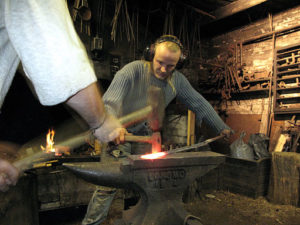Does Anybody Work In Speculative Fiction?
A reprise of an article that first appeared here three years ago, dealing with work—on Labor Day.
Today is Labor Day in the US, so I thought it appropriate to think a little bit about speculative novels and work. My first thought was, Does anybody work? I mean, in epic fantasy, the protagonist and his crew are questing—traveling, for the most part, from one place to another in an effort to find, win, capture, or fulfill whatever the quest requires. Space opera doesn’t seem very different, but the principles are wondering the galaxy instead of roaming the countryside.
So who works?
 I know there are some stories that feature the prince or the warrior or the soothsayer. There are some centered around the dragon keeper (a nod in particular to Donita Paul and her DragonKeeper Chronicles); still others feature the assassin. These, of course, are professions, and there is a certain amount of work connected to what they do.
I know there are some stories that feature the prince or the warrior or the soothsayer. There are some centered around the dragon keeper (a nod in particular to Donita Paul and her DragonKeeper Chronicles); still others feature the assassin. These, of course, are professions, and there is a certain amount of work connected to what they do.
But who maintains the spaceship? Who cooks the dinner? Who shoes the horses? Who navigates the trail?
I think of the old westerns, which I’ve recently had the opportunity to view, and marvel that they are so well plotted, but also believably peopled with working characters. They have the scout and the cook and the wagon master.
 Star Trek, the original, included the same elements, (though, of course, the worker red shirts are inevitably the ones who die in a crisis). The spin-off series maintained that same bit of worldbuilding. Miles was the transporter chief and his wife a botanist. Deanna Troi was the ship’s counselor and Beverly Crusher, the chief medical officer.
Star Trek, the original, included the same elements, (though, of course, the worker red shirts are inevitably the ones who die in a crisis). The spin-off series maintained that same bit of worldbuilding. Miles was the transporter chief and his wife a botanist. Deanna Troi was the ship’s counselor and Beverly Crusher, the chief medical officer.
What about speculative fiction today? Are our stories including characters that tend to the mundane needs of the protagonist? Is there someone looking after the children, even teaching them? Who gets the meals? Who buys supplies? Who does the repair work? Are these characters significant or peripheral?
I wonder if our attitude toward work might not improve if we began to see it as honorable and necessary in our fiction.
But maybe it’s there, and I’m just not noticing.
What speculative novels have you read that showcase someone with an ordinary job?
 Jill Williamson’s By Darkness Hid opens with the protagonist getting up early to feed the animals. It was his job as a slave. However, he quickly advances to become a squire, and off he goes on his quest.
Jill Williamson’s By Darkness Hid opens with the protagonist getting up early to feed the animals. It was his job as a slave. However, he quickly advances to become a squire, and off he goes on his quest.
Patrick Carr’s A Cast Of Stones opens with a drunk given a message to deliver—a job he accepts so he can get enough money to buy another day’s supply of booze. But he soon joins forces with a pair of clergymen and ends up on a quest.
Maybe “ordinary” doesn’t make for a good story. Still, I’d think within stories about the exciting and the exceptional, there need to be those who hold down the fort, who keep the supply lines coming through, who make sure the soldiers have shoes.
What books have you read (or written) that include the everyday in their worldbuilding? What books move those mundane jobs to the forefront and make them significant to the plot?





























So true. There’s the Sword of Lyric series which features working people.
I wish when chars had more ‘ordinary’ professions, it would permeate their lifestyle more, or integrate better with the plot or whatever. Someone taking temporary jobs shoeing horses, etc to earn money for their comrades in the villages they stop at on their journey would be one way. I see stuff like that sometimes, but not as often as it should be. Or it’s there, but only mentioned briefly instead of it being fully integrated into the char’s lives.
Another way to handle it, which is the way a lot of my stories handle it, is to have the chars live relatively simple lifestyles, ones where they are expected to maintain a lot of things on their own. A lot of my assassin chars are like that. They’ll buy things from others and seek help now and then, but they’re quite capable of hunting and foraging for their own food, defending themselves, finding shelter, doing basic weapon maintenance, etc. They will need other regular people to help them now and then, though those are either emergency type situations, or situations where they have the luxury of delegating some of their tasks, like if they belong to a guild and thus have comrades to help them.
In my current WIP, there’s actually a lot of regular jobs involved heavily in the plot. In the second book, for instance, the main char works at the docks, loading and unloading cargo, checking it, etc. His mother is a scientist. One of his sons was apprenticed as a medic for a while. One of the other people he encounters used to sail on a tradeship as a merchant. These jobs factor heavily into who these people are, too. The main char’s job as a dock worker, for instance, heavily shaped the person he became. He got that job when he was around fifteen or sixteen, and it factored heavily into the confidence he gained and helped him earn the money needed to establish his family.
Shout out to Kerry Nietz’s characters who have specific jobs and roles. Of course, in the Dark Trench series, the main characters are slaves, but show initiative and work toward self-improvement. In the Peril in Plain Space books, the main characters are pioneers and homesteaders, so no shortage of work for them.
One of the most memorable, to me, books with a theme of labor is James P. Hogan’s 1982 book Voyage from Yesteryear. It’s been a few years since I’ve read it, but as I recall, the colonized world was set up without the class prejudices of Earth and people found what they liked to do and were good at, worked at it, and exchanged their labor for the labor of others. Now I’ll have to track down a copy and reread that book. . . . I liked it a lot.
I hear good things about Jill Williamson. I’ll have to read her soon.
If the genre is an urban fantasy–imaginary toads in a real garden–the protagonist’s job can be familiar. Even mundane.
Well, I must ask, what exactly did Bilbo and Frodo do all day at Bag End, outside of sit around, write a bunch of stuff, and in Bilbo’s case smoke a pipe, vanish a lot, and never grow old?
Several of Studio Ghibli’s movies have characters doing more-or-less ordinary work. Chihiro in Spirited Away has to find work at the bath house to stick around in that world. In Howl’s Moving Castle, Sophie is a hat maker at first, then the cleaning lady in Howl’s home, and even Howl himself used his powers to earn a coin or two. I haven’t seen it, but I think Kiki’s Delivery Service is about a young witch who uses her magic for a job that’s mundanely magical.
Then there’s Cells At Work, a series about the work the cells in the human body do to keep us going, from Red Blood Cells making deliveries to every part of the body, to White Blood Cells going into combat against germs, even to Platelets doing their work and sealing up cuts and scrapes. The cells are shown as normal people going about their normal work, it’s the context of what that work is, and the chaos caused by germs and infections and the ways the body reacts to them, that makes the series not so normal.
But one of the big draws of such stories is that they are about characters not doing normal stuff. Who wants to read about Knights of the Round Table doing ordinary things, like cleaning out their horse’s stall? If you’re going to have a knight in a story, you want him to battle a dragon, or be in a jousting tournament, or fight off killer bunnies with Holy Hand Grenades, or do some other knightly things that the ordinary person can’t do.
It’s fun when Cerevantes at various times in Don Quijote makes fun of the idea from knight stories that knights don’t have to work…of course, El Quijote has all kinds of things go wrong for him because he doesn’t have the money he needs and doesn’t want to work for it…(Sancho Panza can’t do everything!)
There’s always Taran the Assistant Pig-Keeper. And Alvin Maker is a smith, who does smith-type things.
I immediately thought of Taran too. In addition to being Assistant Pig-Keeper, he spends time learning and practicing various trades (smithing, weaving, etc.) over the course of “Taran Wanderer.”
I did not appreciate that book much as a kid — I thought it was “boring” and “pointless” compared to the adventures of the rest of the series — but reading it as an adult, I was deeply impressed by how wise and thoughtful it is about what it really means to grow up.
Chris Walley’s Lamb Among the Stars characters all have jobs – forester, psychologist, biologist, space captain, stable hand/gardener, quarrier, artist, administrator, mechanic… And all these jobs are valued (and paid) the same.
Stephen McCranie’s Space Boy comic spends a bit of time with the janitorial staff of a generation ship.
Such a great comic! And I really enjoyed that part too.
My sci-fi novelette currently in development features a spaceship’s engineering crewman, a well known musician, and a robot medic/chaplain. The Fifth Element has a rock star, a priest, a down and out ex-cop (or whatever he was). Star Wars features many politicians and Jedi (basically the cops), bounty hunters and smugglers, diner operators and sundry mafia functionaries. But of course in all these stories “something comes up” which prevents just a regular old day on the job. How the personality of the character is shaped by their job, is often a major influence on the plot.
Kinda wonder if more mundane jobs in fiction will take more precedent as time goes on simply because people might run out of ideas otherwise. Things about the character’s identity/profession are more likely to hook readers and fuel more unique story aspects, so as stories get more numerous and repetitive, more authors will probably come to rely more on things like the char’s job description to make their story stand out.
Thought of a couple of more…
Snow White with the Red Hair–Shirayuki is an herbalist, and remains one throughout the series, and her adventures usually play off in some way from her work.
Violet Evergarden–One of the best examples of how a character’s job as something like a transcriber for other people leads into the main parts of the story for herself and those she encounters.
Nearly every book by L. E. Modesitt that I’ve read gives central focus to everyday matters, and most give a great deal of emphasis to the details of some craft; we see the characters’ development as a carpenter, blacksmith, painter, musician, government administrator, etc., given as much weight as (and usually connected to) their development as an order-mage, imager, etc.
In the “Circle of Magic” quartet, and sequel series, by Tamora Pierce, each major character has magic that works through a unique expression, most of which are seemingly-mundane jobs (weaving, metalworking, gardening, glassworking, etc.)
Taran from The Book of Three by Lloyd Alexander is a pig keeper. The pig, Hen Wen, is magical but swills at the trough like any other swine.